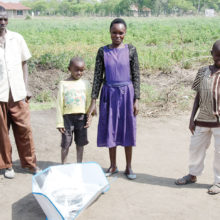Our national parks The National Park Service will be 100 years old on August 25. To celebrate this grand event President Obama has decreed in 2016 all fourth graders and their families may enjoy our 400 plus park facilities free of admission charges. Many families are taking this open door policy to experience nature which…
Tag: Conservation Corner
Features, July 2016
Conservation Corner
Usefulness of solar cooking Pauline Lee If you are using a solar cooker, you can cook anywhere outdoors when the sun is out – in a camp, on the beach, on a boat, outside of an RV, or in the yard. While your food is cooking, you don’t need to stir and tend it; it…
Features, June 2016
Conservation Corner

Pauline Lee Did you know that nearly three billion people in the world still rely on wood, animal dung, crop waste, charcoal, or fossil fuels for cooking and boiling water? Yes, these are the women and girls in third world countries, the world’s poorest households where fuel is about 40 percent of these households’ budget.…
Features, May 2016
Conservation Corner
Pauline Lee Why is organic produce healthier than fertilizer grown produce? While they may appear no different from each other, their biochemical composition may have important differences. They both have common constituents such as carbohydrates, fats and proteins. Organic produce, however, has micronutrients that fertilizer grown produce lacks. These components are vital for total health.…
Features, April 2016
Conservation Corner
Earth Day 2016 Pauline Lee The first Earth Day on April 22, 1970 involved 20 million Americans from all walks of life and is widely credited with launching the modern environmental movement. The movement encourages awareness of growing problems of air, water and soil pollution and promotes ecology and respect for life on the planet.…
Features, March 2016
Conservation Corner
Pauline Lee Waste Free Kitchen Handbook by Dana Gunders guides the reader to eating well, while saving money by wasting less food. Furthermore, the environment benefits because wasted food decomposes in landfills to form methane, a greenhouse gas that is 34 times more potent than carbon dioxide. This easy to use book has practical strategies, engaging…
Features, February 2016
Conservation Corner
Food waste Pauline Lee Did you know that one-third of all the food production in the world is lost or wasted? This amount of food is worth US $750 billion. In less developed countries, losses are due mainly to food decay in the field and spoilage on the way to the market. Curiously in the…
Features, January 2016
Conservation Corner
Pauline Lee A new frontier in human health has been opened up by the Human Microbiome Project, launched in 2008 by the National Institutes of Health. This initiative has begun cataloging the genetic material in bacteria that live in and on our bodies. Can you believe the bacteria population in each person outnumbers the human…
Features, December 2015
Conservation Corner
Pauline Lee Many of us know of bacteria as germs. Germs make us sick. Since the existence of bacteria was first discovered in 1676, much of the scientific literature has been focused on pathogens and that has also framed our view of bacteria. Yet, the majority of bacteria we come in contact with on a…
Features, November 2015
Conservation Corner
Conserve antibiotics – save lives Pauline Lee The annual Get Smart About Antibiotics Week will be observed worldwide from November 16-22. Penicillin, the first antibiotic used in the world, was discovered in 1928 by Alexander Fleming. Fleming was awarded the Nobel Prize in 1945 for this miracle drug that saved countless lives from infections caused…
